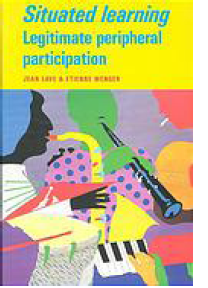Jean Lave and Etienne Wenger argue that learning is necessarily situated, a process of participation in communities of practice, and that newcomers join such communities via a process of ‘legitimate peripheral participation’—or learning by immersion in the new community and absorbing its modes of action and meaning as a part of the process of becoming a community member.

Learning viewed as situated activity has as its central defining characteristic a process that we call legitimate peripheral participation. By this we mean to draw attention to the point that learners inevitably participate in communities of practitioners and that the mastery of knowledge requires newcomers to move toward full participation in the sociocultural practices of a community. ‘Legitimate peripheral participation’ provides a way to speak about the relations between newcomers and old timers, and about activities, identities, artifacts and communities of knowledge and practice. It concerns the process by which newcomers become part of a community of practice. A person’s intentions to learn are engaged and the meaning of learning is configured through the process of becoming a full participant in a sociocultural practice. This social process includes, indeed it subsumes, the learning of knowledgeable skills …
[T]he organization of schooling as an educational from is predicated on claims that knowledge can be decontextualized, and yet schools themselves as social institutions and as places of learning constitute very specific contexts. Thus, analysis of school learning as situated requires a multilayered view of how knowing and learning are part of social practice … [P]ervasive claims concerning the sources of the effectiveness of schooling (teaching, in the specialization of schooling in changing persons, in the special modes of inculcation for which schools are known) stand in contradiction with the situated perspective we have adopted. All this have meant that our discussions of schooling were often contrastive, even oppositional …
[L]egitimate peripheral participation is not itself an educational form, mush less a pedagogical strategy or a teaching technique. It is an analytical viewpoint on learning, a way of understanding learning. [T]his viewpoint makes a fundamental distinction between learning and intentional instruction.
Lave, Jean, and Etienne Wenger. 1991. Situated Learning: Legitimate Peripheral Participation. Cambridge: Cambridge University Press. pp. 33, 29, 40. || Amazon || WorldCat
